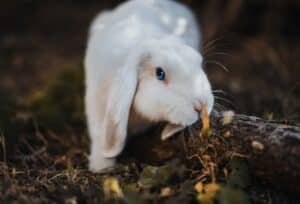Did you know that understanding your rabbit’s hunger signs can greatly impact their overall well-being? In this guide, we delve into the world of rabbit hunger cues, balanced diets, and how to maintain a healthy weight for your furry friend. We will also discuss “how to know when your rabbit is hungry” so that you can ensure their needs are met.
Key Takeaways
Understand rabbit hunger signs to ensure their health and well-being.
Establish a routine, provide variety in diet, and create enrichment activities for healthy eating habits.
Monitor weight regularly and adjust portion sizes based on age, stress levels, & health concerns.
Understanding Rabbit Hunger Signs

It’s vital for your rabbit’s health and happiness to recognize when it is hungry. Comprehending their eating habits helps us feed them a balanced diet that meets their nutritional needs and curbs overeating.
Some common hunger signs in rabbits include searching for food, begging behavior, and restlessness.
Searching for food
When rabbits are hungry, they may engage in rabbit-eating behavior, sniffing around their food dish or hay rack, searching for something to eat. However, if a rabbit stops eating, it could be a sign of a health issue. As a rabbit eats, they might also consume their food more rapidly than usual, which could lead to overeating if not addressed. Understanding a rabbit’s eating habits can help prevent such issues, especially when we know what rabbits eat and how rabbits tend to behave during mealtime, even in the case of wild rabbits.
Taking note of these behaviors allows you to regulate your rabbit’s food intake and ward off possible health complications.
Begging behavior
Rabbits may beg for food by pawing at you or their food container when they’re hungry. This behavior is their way of communicating their hunger or seeking attention and affection, as rabbits are natural grazers.
Resisting their begging and supplying them with a nutritious diet and regular feeding schedule that corresponds to their eating habits is vital. If your rabbit is begging for food outside of meal times, consider offering enrichment activities or toys to keep them engaged.
Restlessness
Restlessness or increased activity can be a sign that your rabbit is hungry and searching for food. They might chew on their cage, groom excessively, or constantly look for more food, such as timothy hay.
Identifying these behaviors allows you to tackle your rabbit’s hunger and ensure they receive a balanced diet that satisfies their nutritional requirements.
The Importance of a Balanced Diet

Maintaining a healthy rabbit and warding off persistent hunger necessitates a balanced diet. The three main components of a rabbit’s diet are hay, vegetables, and pellets, which provide the essential nutrients they need for optimal health.
Hay
Hay should make up the majority of a rabbit’s diet, providing essential fiber and nutrients that keep their digestive system functioning properly. Grass hay, such as timothy or oat hay, is the most suitable option for rabbits, as it supports healthy teeth and provides the necessary fiber for digestion.
Legume hay, such as alfalfa, can be fed in moderation, mixed with grass hays. Feeding legume hay exclusively for long periods is not recommended as its high calcium and protein content can cause complications if overconsumed.
Vegetables
Vegetables provide additional vitamins and minerals that are essential for a rabbit’s health. Suitable options for rabbits include:
Leafy greens, such as kale, collard greens, and dandelion greens
Carrots
Celery
Bell peppers
Vegetables should make up about 10-15% of a rabbit’s diet.
Introducing vegetables to your rabbit’s diet should be done gradually to prevent digestive problems. Before introducing fresh vegetables, ensure your rabbit consumes grass hay for at least two weeks. When adding a new vegetable, monitor your rabbit’s reaction and ensure it’s not harmful to them.
Pellets
Pellets should be fed in limited quantities to supplement a rabbit’s diet and prevent overeating. Unflavored brown pellets are the best option, as they provide essential nutrients without unnecessary additives.
Feeding muesli-type foods should be avoided as it can result in an imbalanced diet and obesity in rabbits.
Feeding Schedule and Frequency

Serving your rabbit two meals a day, in line with their crepuscular tendencies, aids in controlling their appetite and warding off persistent hunger.
Rabbits are most active at dawn and dusk, so providing food during these times can satisfy their instincts and maintain a healthy appetite.
Twice a day feeding
Feeding rabbits twice a day, with access to hay throughout the day, can help maintain a healthy appetite and prevent overeating due to constant hunger.
Regularly weighing your rabbit and adjusting portion sizes based on their weight can also aid in controlling their appetite and ensuring they receive the proper nutrients.
Crepuscular tendencies
As mentioned earlier, rabbits are most active at dawn and dusk. Feeding them during these times can help satisfy their natural instincts and promote a healthy appetite.
Feeding them when they are likeliest to eat ensures they get the required nutrients and keep a balanced diet.
Monitoring Your Rabbit’s Weight

Monitoring your rabbit’s weight through regular weigh-ins and adjusting portion sizes accordingly can help prevent overeating and maintain a healthy weight.
Understanding factors like age, stress, and health issues is vital as they can influence a rabbit’s appetite and necessitate diet adjustments.
Regular weigh-ins
Regularly weighing your rabbit can help you identify any changes in their weight and adjust their diet as needed. You can weigh your rabbit using a kitchen scale or a pet scale, and make necessary adjustments to their portion sizes based on the results.
Monitoring your rabbit’s weight ensures they receive the correct amount of
Adjusting portion sizes
Adjusting portion sizes based on your rabbit’s weight can help prevent overeating and maintain a healthy weight.
If your rabbit has gained weight, reduce their portion sizes, and if they’ve lost weight, increase their portion sizes accordingly.
Factors That Can Affect Rabbit’s Appetite

Age, stress, and health issues are factors that can influence a rabbit’s appetite. Being cognizant of these elements helps them adjust their diet as needed.
Comprehending the different factors influencing a rabbit’s appetite enables you to make knowledgeable decisions about their diet and uphold their healthy weight.
Age
A rabbit’s age can affect their appetite, with younger rabbits requiring more food for growth and older rabbits needing fewer calories. Keeping track of their weight and modifying their diet according to their age is key to maintaining a healthy appetite and avoiding overeating.
Stress
Stress can cause a temporary loss of appetite in rabbits, so it’s important to address any potential stressors in their environment.
Providing a safe and comfortable habitat for your rabbit can ease stress and foster a rabbit’s healthy appetite.
Health issues
Health issues, such as dental problems or gastrointestinal issues, can affect a rabbit’s health, particularly their appetite, and may require veterinary intervention.
Should your rabbit lose appetite due to health issues, seek advice from a veterinarian for the right course of action.
Tips for Encouraging Healthy Eating Habits

Encouraging healthy eating habits in your rabbit through variety in their diet, establishing a routine, and providing enrichment can help prevent constant hunger and promote overall well-being.
Adhering to these guidelines guarantees your rabbit gets the necessary nutrients and sustains a healthy weight.
Variety in diet
Providing a variety of hay, vegetables, and pellets can help keep your pet rabbits, especially female rabbits, as grazing animals, interested in their food and prevent boredom-related overeating. Encouraging your rabbit to eat hay is essential for maintaining a healthy diet.
A diverse diet ensures they receive essential nutrients and maintain a balanced diet.
Establishing a routine
Establishing a consistent feeding routine can help regulate your rabbit’s appetite and prevent constant hunger. Feeding them at regular intervals guarantees they get the necessary nutrients and keep their diet balanced.
Providing enrichment
Providing enrichment, such as toys and opportunities for exercise, can help keep your rabbit mentally and physically stimulated, reducing the likelihood of overeating due to boredom.
Providing activities and objects that enhance their well-being encourages healthy eating habits and prevents persistent hunger.
Summary
In conclusion, understanding your rabbit’s hunger signs, providing a balanced diet, and establishing a consistent feeding routine are essential for maintaining their overall well-being. By monitoring their weight, addressing stressors, and providing enrichment, you can ensure your rabbit receives the proper nutrients and maintains a healthy weight. Remember, a healthy rabbit is a happy rabbit!
Frequently Asked Questions
Do rabbits get hungry easily?
Rabbits are natural grazers and need to be eaten constantly throughout the day. If there is no food available for them for more than 12 hours, they can go into gastrointestinal stasis. As such, rabbits do get hungry easily.
How do I know if I’m feeding my rabbit enough?
It’s important to not overfeed pellets, with one-eighth of a cup per day for a small rabbit being sufficient. Additionally, provide hay in an amount about the same size as your bunny daily. Signs that your rabbit is not getting enough food include weight loss, small or fewer droppings, and diarrhea or soft feces.
What are some common hunger signs in rabbits?
Common hunger signs in rabbits include searching for food, begging behavior, and restlessness, indicating that they are ready to be fed.
How can I ensure my rabbit has a balanced diet?
Ensure your rabbit has a balanced diet by providing hay, vegetables, and pellets in the correct proportions.
How can I monitor my rabbit’s weight?
Monitoring your rabbit’s weight regularly and adjusting their portion sizes accordingly is the best way to ensure your rabbit stays healthy.



